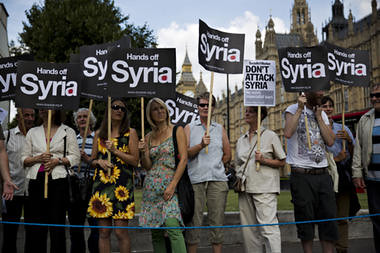
British demonstration against war on Syria outside parliament in London on August 29, 2013. The House of Commons voted down Cameron war program., a photo by Pan-African News Wire File Photos on Flickr.
Fervor for Syrian intervention cools in Britain and France
While punitive strikes against Syria seemed inevitable just days ago, British and French leaders have been stymied by a lack of support at home
By Sara Miller Llana, Staff writer / August 29, 2013
The Christian Science Monitor
After a flurry of condemnation from the United States, Britain, and France of an alleged chemical weapons attack by the forces of Syrian President Bashar al-Assad, a punitive strike had seemed only days away – even as the UN inspectors' investigation of the attack remains a few days from completion. But in the past 24 hours, the US's European allies have been stymied by a lack of political and public support at home – an apparent backtrack taking place in the shadow of the deeply unpopular Iraq war.
On Thursday, France's government spokeswoman, Najat Vallaud-Belkacem, was quoted by Bloomberg as saying: “Before acting, we need proof,” referring to a final report by UN inspectors in Damascus that is expected to be issued over the weekend.
The French push for more time comes as British lawmakers have blocked British Prime Minister David Cameron's bid to react immediately in Syria, while Angela Merkel in Germany, who faces parliamentary elections next month, is carefully treading an issue in a nation deeply ambivalent about military intervention.
Leaders of the European Union have called for working with Russia to first gain political support for an intervention or other solution at the United Nations Security Council.
“This creates a climate of 'don't hurry,' ” says Yves Boyer, a defense and international relations expert at the Foundation for Strategic Research and professor of international relations at France’s Polytechnic School. "We are not at a point for punitive strikes.… There are still political conditions in the US and UK vis-à-vis Russia that have to be met.”
In a poll of the French public by the agency Ifop and published in the daily Le Figaro, 59 percent of respondents said they would oppose intervention in Syria.
France had joined Germany and Russia in opposing the invasion of Iraq 10 years ago, and that decision created a wedge between the US and France on military matters. But since then, first under former President Nicolas Sarkozy and now with President François Hollande, France has tilted toward intervention, says Daniel Levy, the director for the Middle East and North Africa program at the European Council on Foreign Relations.
But the false claims of weapons of mass destruction that justified an intervention in Iraq weigh on the international psyche, particularly in Britain and the US, which led the intervention.
Mr. Levy, who argues in a memo today that the West is being hasty in calling for immediate action, says that French and British leaders failed to properly take the political temperature when pushing for an imminent strike before UN inspectors had released their conclusions.
That is especially true in Britain, Levy says. After having recalled his nation's parliament to vote on the use of suspected chemical weapons in Damascus – with fatalities placed anywhere between 350 and over 1,000 – Mr. Cameron faced deep skepticism from the opposition Labour Party, which demanded more robust proof of the details of the attack.
Today he said Britain would not act until the UN report is complete and unless there were support for action within the UN Security Council.
“It would be unthinkable to proceed if there was overwhelming opposition in the [UN] Security Council,” Cameron told Parliament today.
Hollande does not need his parliament´s vote to launch a strike if it is less than four months long, and today French Defense Minister Jean-Yves Le Drian said: "The Armed Forces are in a position to respond to the requests and the decisions of the president once he reaches that point.”
Both British and French officials still support punitive action. “It is clear that we cannot let this go without a reaction that is reflected, proportionate, and firm,” French Foreign Minister Laurent Fabius said on Thursday.
Hollande also met with a Syrian opposition leader today, laying out France's goals for a medium- and long-term political solution in Syria, says Dr. Boyer.
"Everything must be done to reach a political solution, but that will not happen unless the coalition is capable of appearing as an alternative, with necessary force, notably its army," Hollande said. "We will only achieve this if the international community is capable of bringing a stop to this escalation of violence, of which the chemical massacre is just one illustration."
But although France supports a punitive response, it will not act alone while Britain has its hands tied and the US is not moving, Boyer says. Ideally the three nations would form a coalition, but "the key factor is really Obama's decision to implement a strike, and then the French would be participating on the side.”
The Germans have been reticent about military intervention since the end of World War II, not only opposing intervention in Iraq but more recently abstaining from it in Libya.
A poll today for ZDF television showed 58 percent of the German public oppose intervention – although in a separate question, 41 percent say that Germans should support US action.
What this means for US action is unclear.
Unlike in Iraq, the US has said it will not act unilaterally in Syria without its allies, US Defense Secretary Chuck Hagel said today.
"If any action would be taken against Syria," he said, "it would be an international collaboration."
No comments:
Post a Comment